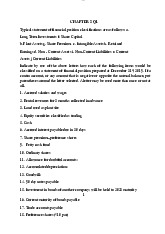











Preview text:
lOMoAR cPSD| 48632119 Practicing speaking Part 1: Short-talk
1. Explain the title "No hiding place"/ "No privacy"
⇛ Nowadays, no hiding place/no privacy is a huge problem for the internet society. Companies and
organizations collect information about people all the time. Moreover, the use of video surveillance cameras
is also growing. Surveillance is everywhere in our society, often without our knowledge. And people willing
to give more personal information to get the benefits.
2. "There is no privacy in the internet society". Agree or disagree? Why?
⇛ From my point of view, I agree that there is no privacy in the internet society because of the following
reasons. Firstly, our personal information is compromised and we are not protected on the internet. Many
companies and organizations will try to get our information in order to use it with bad intentions. Secondly,
there are a lot of Cybercrimes. For instance, your private messages, pictures, videos can be bought or spread
over the internet to earn money. Moreover, cameras that are developed can see through clothing, walls or
cars. In conclusion, be careful when using the internet so as not to be violated our privacy.
3. Why is modern life not private?
⇛ Modern life is not private because companies can collect your information everywhere and every time.
First, a cookie is a small file that a company can send to your computer when you visit the company’s
website. It tells them a lot about your browsing habits. Second, when you turn on a mobile phone, the phone
company can monitor calls and also record the location of the phone. Third, the use of video surveillance
cameras is also growing. Fourth, engineers are now developing cameras that can “see” through clothing,
walls or cars. Satellites can recognize objects only one meter across. We can attach tracking chips to
products or people. All this monitoring generates a mountain of data about us.
4. How do we live in a society where someone somewhere is recording nearly everything we do? ⇛ As
we know, we are living in the world where the technology is more and more growing. So, being recorded
nearly everything we do is easy to understand. For example, we can be followed by the cameras.
Accordingly, we must adapt to that society. Everything we do must be careful. We shouldn’t access to the
web that don’t have origin. We also shouldn’t post so much information about us on the social network.
Although, being recorded everything we do, we don’t need to make ourselves live in a framework and not
be more worried. Live comfortably as the way we want as long as we are always cautious and obey the laws.
5. Talk about business etiquette in New York/Sydney/London/Vietnam lOMoAR cPSD| 48632119 *New York
Everywhere has its business etiquette. In New York, breakfast meetings start at 7 am. It is important to be
on time because they don’t like people who aren’t punctual. Handshakes and eye contact are important parts
of greeting others. When they greet people or when people walk into the room they stand up because it is
impolite to stay seated when others are standing. Most people dress in suits, women also wear business
dresses – it’s important to look smart. They usually eat at their desk or a restaurant at lunchtime. People are
very competitive so they always talk about business after work. *London
Everywhere has its business etiquette. In London, it is important to be on time for meetings because the
British consider time a valuable resource and are economical with it. They found loud voices, shouting, big
gestures intrusive and rude. Handshakes and eye contact are important parts of greeting others. When they
greet people or when people walk into the room they stand up because it is impolite to stay seated when
others are standing. People think the British dress in formal clothes but things are changing. Nowadays,
some men still dress in formal business suits but a lot of people wear casual clothes to come to work. They
often eat a quick sandwich and coffee for lunchtime. They like to go to the pub with colleagues and talk about everything they like. *Sydney
Everywhere has its business etiquette. In Sydney, they are easy-going and relaxed about rules. A handshake,
a smile, and eye contact are necessary parts of greeting others. When they greet people or when people walk
into the room, they stand up because it is impolite to stay seated when others are standing. During office
hours, men often wear a jacket and tie and women often dress in a smart dress or a business suit. But they
prefer informal clothes when the weather is hot. They usually go out for a sandwich at lunchtime. It is easy
to talk to Australians who are very friendly. But it helps a lot if you talk about sport or weather. *Vietnam
Everywhere has its business etiquette. In Vietnam, breakfast meetings start at 7:30 am. It is important to be
on time because they don't like people who aren't punctual. A handshake and a slight bow of the head are
used for saying hello and goodbye in Vietnam. When they greet people or when people walk into the room,
they stand up because it is impolite to stay seated when others are standing. When giving or receiving a
business card, do it with both hands. The dress code depends on the location of meetings. For example, in
Hanoi city they dress in formal clothes, while they wear casual clothes in Ho Chi Minh city. They usually eat
at the canteen or a restaurant at lunchtime. After work, they often talk about business or sports especially
football because Vietnamese love football so much.
6. "Courtesy is no longer respected" and "it is stuffy to be polite". Agree or disagree? Why? ⇛
According to Oxford Dictionary, polite is defined as “having or showing good manners and respect for lOMoAR cPSD| 48632119
the feelings of others”. Showing good manner + respect: can this change with time? Can this become stuffy?
What may become stuffy is being formal, being casual, informal may be better than being too formal in
many circumstances. But being polite is always a good thing.
7. What is the point of top-end fashion?
⇛ The haute couture dress can cost more than $100.000. The commercial point is that haute couture is the
fashion house's loss leader. It creates the image of the brand. Most customers feel happier buying a famous
brand than a product they don't know. Fashion shows may be expensive but the publicity they generate
works out cheaper and more effective than spending $80,000 a page on advertisements in the glossy fashion
magazines. The image of the brand has to appeal to the target market. Most people could never wear the
clothes, but the idea is to create a buzz.
8. Explain "Fashion is a business"
⇛ Fashion is a multi-million-dollar industry that has significant influence on the economical and societal
aspects of a society. Ultimately, fashion is a business because it requires a business plan, creation of a brand,
company structure, adequate financial budgeting and a business name among others. Marketing experts work
hard to create brands and promote the brand image through advertising campaigns. This process of branding
is an important part of marketing. With advertising, graphic design and media, it all adds up to real economic weight.
9. Explain "The branding process is an important part of marketing"
⇛ The branding process is a series of well-defined activities designed to create, communicate, and
strengthen a company's brand. A company creates a name, a logo (a symbol), or a design that everyone can
easily recognize and identify a brand and marketers promote brand image through advertising campaigns.
The branding process is an important part of marketing because a successful branding process makes a good
brand image, which can confirm the brand's credibility in the marketplace, create customer loyalty, motivate
the buyer to make a purchase, and turn potential customers into regular customers. As a result, it brings more profits to the company.
10. What have you learn from the article "Passion into profit"?
⇛ I have learnt many things from the article "Passion into profit". Firstly, I knew many multi-million pound
companies. Secondly, I attracted more investment by travelling around the world to advertise my product.
Thirdly, I recognize that money and challenges are the important factors. Finally, if you want to be successful, you need advice.
11. What makes a successful company?
⇛ Even Though there are different products and services, management styles and corporate cultures, the way
businesses succeed depends on a few basic factors. Firstly, they must prepare a good business plan. Business lOMoAR cPSD| 48632119
and marketing plans are the road maps to become a successful company. Therefore, a good plan keeps the
company focused on the activities the generate profit. Secondly, one of the primary factors for company
successful is employee retention. A successful company will have many benefits for their employees such as
high salary, health benefits, career develop ill lack the guidance and resources necessary to succeed. Finally,
it is difficult for a company to be successful without financing. It helps the company maintain daily activities
and fund the projects; then they have a good chance of making profit. In conclusion, a successful company
will need all essential components abolement and a safe working environment. Then they will work hard and
effort to make the company better and better. Next, strong management becomes an important part of other
company success elements. Without a strong management team, the company will grow significantly.
12. What can be reasons for the failure of a company?
⇛ There are many reasons for the failure of a company: Firstly, they don’t know how to plan, it means that
when you ignore the value of planning and don’t bother to learn the methodology of planning. Secondly,
they don’t know how to manage people, this problem arises from failure to listen to suggestions or
complaints and provide harsh criticism under the guise of constructive feedback. Finally, they don’t know
how to market. If a company can’t clearly state why their product is different from others to it in the
marketplace, all marketing efforts will be wasted.
13. "Being passionate about what you are doing is the secret to the success". Agree or disagree? Why?
⇛ I agree with the opinion: “Being passionate about what you are doing is the secret to the success” There
are a number of reasons why passion is the secret to the success. Firstly, a passion will keep your dedication
to making your business work no matter how difficult the process. Moreover, passion will help you focus
that helps you function effectively and accurately while executing your tasks. Furthermore, passion will get
your creative juices flowing. Finally, passion will bring the appreciation of customers which make them to
be your regular customers. Remember to work on developing your pasion, if you want success in your career.
14. What are the steps to set up a new business?
Firstly, you should make sure that the country has a strong economy. That means low inflation and a stable
currency. The better the prospects for growth are, the stronger the economy is.
Secondly, does the location have a good infrastructure? Does it have a modern airport, good roads or
shipping facilities if you need them?
Finally, you also need to do a research about the financial side. How much will it cost to rent office space?
Does the government of the region offer special policy such as low taxation? If the government has a good
attitude to foreign country, you should set your office right now.
15. What factors are important when deciding where to locate a business? (For example: Location ...)
⇛ There are many factors deciding where to locate a business such as brand image or finance. Are they
really important factors? I don't think so. I think that if you want to set up a business, you need some lOMoAR cPSD| 48632119
considerations. Firstly, you should choose a suitable location because you need to answer a lot of
questions about customers, staff, support services and cost. For example, is the location convenient for
customers? Do local staff have the required skills to work efficiently? Are there services offering
reasonable advice, training or support? and so on. Secondly, you take infrastructure and transport
networks into account. Therefore, it is important for shops and restaurants to be conveniently located for
customers. Thirdly, you deliberate about the government's incentives including grants, loans and tax
breaks. Finally, you must face challenges such as cultural and language barrier, legal issues and exchange rate.
16. What factors are important when setting up a region’s office in a foreign country? (Strong
economy, good infrastructure, good financial site)
Firstly, you should make sure that the country has a strong economy. That means low inflation and a stable
currency. The better the prospects for growth are, the stronger the economy is.
Secondly, does the location have a good infrastructure? Does it have a modern airport, good roads or
shipping facilities if you need them?
Finally, you also need to do a research about the financial side. How much will it cost to rent office space?
Does the government of the region offer special policy such as low taxation? If the government has a good
attitude to foreign country, you should set your office right now.
17. What lessons has Dubai learned from Singapore and Hong Kong to become a tourist resort and
important business center?
⇛ The lesson that Dubai learned from Singapore and Hong Kong to become a resort and important business
center is development strategy, this strategy is building free-trade zones and tax-free shopping to attract more foreign colleges.
18. Describe some methods of promoting a product or service?
⇛ There are some methods of promoting a product or service that we need to know. The most effective way
to promote products to a large number of people is to advertise. There are several different advertise media
that we can use such as TV, radio, press, newspapers, … Moreover, we have a way which is used popularly.
That is personal selling. This means employing sales representatives to make regular sales visits to customer
and potential customer. Then, there are sale promotions. These include special offers such as 10% reduction
in price to encourage people to buy or organizing competitions and free gifts. Another method of promotion
is public relations. This includes creating news and getting information about company or its products in the
press or on TV. The next method is direct marketing. This is all sales activities where consumers can buy the
product immediately such as direct mail. And finally, we have sponsorship. A company pays money to have
its name linked to an event or a person such as a sports personality. The person wears clothing with the name of the company. lOMoAR cPSD| 48632119 Part 2: Short questions 1. What is data -
Data are characteristics or information, usually numerical, that are collected through observation. In a
more technical sense, data are a set of values of qualitative or quantitative variables about one or more person or objects. -
Data is everywhere. It is a collection of facts such as numbers words, measures... There is qualitative
of data which is non - numerical data. Qualitative data can be used +to classify or categorize something. For
example, companies and organizations collect data from people all the time, companies conduct research
into people buying’s habits so that they can improve their marketing, organizations collect data for
surveillance purposes to help stop criminal activities and increase security. -
Data can be collected in many ways. The simplest way is direct observation. For example, you want
to find how many cars pass by a certain point on a road in a 10-minute interval so stand near that road, and
count the cars that pass by in 10 minutes.
2. What kind of data do companies collect? -
Companies collect data from their customers to increase their marketing such as: name, address,
buying habits, phone number, .... because data is one of the most valuable resources today’s businesses have.
The more information companies have from their customers, the better they can understand customers’ interest, wants and needs. -
Companies also collect data about customers’ marital status like how many people are there in their
family, how many kids they have. For example, furniture companies can sell a new sofa, new bed for a newly married couple. -
The information the companies collect depend on what kind of their marketing. For example, any
local brands, any luxury brands have to know about trending or they will create a buzz then they sell their products. -
Companies collect information about the competition too, about prices, qualities of products.... They
have to have a good business plan, a good strategy so they can beat their competitors and they can increase
their marketing, they improve their services or products.
3. Why do companies collect data? -
Perhaps the biggest reason why so many companies collect consumer data is that it helps them to get a
much better understanding the way of their consumers in which they can improve their marketing. -
Data makes it much better easier for your company to understand what your customers wants from your
company, the specific products or services they are looking for, and even how they prefer to interact lOMoAR cPSD| 48632119
with your brand. When you know more about your customers, you can tweak everything about your
business to better fit their needs. You can also improve the ways in which you communicate with your
target market, optimize the website to improve the user experience, and much more. -
If you collect and use data in the right way, you can make better decisions about: • Finding new customers • Improving customers retention •
Improving customers services • Better managing marketing efforts • Predicting sales trend. -
Data also help you to understand and improve business processes so you can reduce wasted money and
time. For example, bad advertising decisions can be one of the greatest of resources in a company. -
So, if you don’t collect data from your customer, you won’t rank out your competitors.
4. Why is it important to manage information well? How to manage information well? (4 steps, Listening 4) -
It is important to manage information well because you can save a lot of time if you have a good filing system. -
4 steps to manage information well are that: •
The first step is to decide how to structure your filing system •
The second step is to create files for each kind of material •
The third step is to arrange the files for easy access •
The final step is to keep the filing system up-to-date.
5. What is etiquette? What is business etiquette? -
Etiquette is the name we give to the rule to being polite in the social groups. Etiquette is what makes
human being different from animals. It is necessary for an individual to behave in a responsible manner
acceptable to the society. People around us must not feel uncomfortable by our behaviors. Etiquette is very
important when you communicate, when you work or when you stay with other. Etiquette helps us show
respect and consideration to others and makes others glad that we are with them. Without proper manners
and etiquette, the customs of polite society would soon disappear and we would act more like animals and less like people. -
Business etiquette is a set of rules that govern the way people interact with one another in business,
with customers, suppliers, with inside or outside bodies. Business etiquette is important for people who often
have to make new contacts and build relationships in their work. Politeness also help to improve the working
environment for people in the same office. Some cultures and situations are formal, which mean that you
have to follow the rules like: you go to work on time, you must eat some smell foods while people are
focusing on their work, you wear the suitable clothes to work, you have to respect your colleagues and don’t
distract them, just ask when you really need their help because we all have our own job. You also turn your
phone down or off when you are in office, it’s ok when you forget once in a while, but don’t bet that one lOMoAR cPSD| 48632119
person who leaves their phone at top volume and gets calls all day long. Other cultures and situations are informal.
6. Give examples of good manners at work/in class - At work: •
Say please and thank you whenever you are asking for something or asking someone to do something. •
Say “hello” and “goodbye” •
Don’t ignore people in the elevator • Offer to get coffee •
Say excuse me. If you want someone to get out of your way, if you walk between two people having a conversation.... •
Don’t interrupt people when they are speaking. If you must interrupt, say excuse me... •
Hold the door, you have to always look behind you and see if anyone else is coming. If someone is, hold the door open for them. •
Turn your phone down or off when you are in the office - In class: •
Take responsibility for your education • Attend every class • Get to class on time • Turn mobile phone off • Come to class prepared • Turn in your work on time
7. Give examples of bad manners at work/in class? What should be done to stop them? - In class: • Late for school •
Eating while your teacher is teaching •
Talking very much without permission • Sleeping in the class • Not doing homework • Not paying attention • Distracting other • Ignoring the deadline • Using bad languages - At work • Wearing unsuitable clothes lOMoAR cPSD| 48632119 • Usually late for work •
Being rude to people who offer to help you •
Ignoring people when you meet them •
Don’t turn down or off your phone when you are in the meeting • Distracting your colleagues • Using bad languages •
Eating while people are working
- To stop them we should: • Give them advices •
Show them the disadvantages of what they have done •
Meet with the person int a private location and explain how his or her bad manners are affecting you •
Make sure you understand your company’s rules and you can point out other bad manners •
You can find help from your manager or a representation.
8. What does "being polite" mean? -
Politeness is about showing respect to others. It means thinking about others’ feelings. In formal
situations, we follow standard rules for politeness. In business, we are usually polite when we make new
contacts, meet new customers or people from other companies. Politeness is often linked to status. We are
usually more polite to people above us in the organization. In today’s working environment, most managers
show respect for their workers. They might say:” we really need the report as soon as possible. Could you do
it today?” if you consider other people’s feelings, they are usually more willing to work hard to help and to cooperate.
9. How important is business etiquette/being polite? -
Business etiquette is important because it creates a professional, mutually respectful atmosphere
and improves communication, which helps an office serve as a productive place. People feel better about
their jobs when they feel respected, and that translates into better customer relationships as well. •
Business etiquette can determine the success of a company. It plays a role in creating a company’s
image. Business etiquette includes the following manners of behaviors: greeting people in a polite way,
listening patiently to what clients have to say... •
Business etiquette skills are incredibly important in the professional world because they help you:
know what to do in business and social situation, connect better with your coworkers and clients, increase
your level of confidence in business, develop a strong and positive reputation, create a positive and collegial work environment. •
Good business manners are the measures for advancing your career. In the business world, people
with good manners are rewarded for their professional and polite skills. For example, an employee who lOMoAR cPSD| 48632119
shows up to the meeting on time (or early) and is ready to takes notes has a better chance of impressing his
supervisor than the employee who shows up the meeting late, and forgets to bring a pen. •
Making a good first impression is important. The way you dress, for instance, impacts the way you
are perceived by others. Other people’s impression of you should be positive so that they can continue doing business with you. -
Being polite in the workplace is a useful skill. Not everyone has it and i bet you can even think of few
less than polite individuals that you work in right now. Being courteous can take effort to develop and
use consistently, especially in difficult workplace. -
At some point, a parent a teacher or another authority figure may have told you that it is important to use
your “please and thank you”. -
Being polite is a simple way to keep your workplace civil and positive, even the face of challenging
tasks and negative events. A good attitude helps to keep employees on the same team and keeps them
from being perceived as standoffish, rude or difficult and helps maintain the idea that everything is under control. -
Business is about relationships. Good relationships can lead to greater trust and better partnerships.
Being polite is the first step.
10. What is image/brand/brand image?
- Image is the general opinion most people have of a company or product.
- Brand image is the opinion people have of a brand
- A brand is an identifying symbol, mark, logo, name, word, and/or sentence that companies use to
distinguish their product from others.
11. What is the process of branding?
⇛ The process of branding is creating brand image, promoting brand name and holding brand loyalty of customers steady.
12. Would you pay more for a designer label? Why?
I would be pleased to pay more for a designer label because of a number of reasons:
• higher the value of myself • feeling confident
• looking more luxury and fashionable
• not being worried or ethical about quality.
13. What does "creating a buzz" mean?
⇛ The phrase “creating a buzz” means drawing positive attention and interest in something or creating
interest in a product/service. lOMoAR cPSD| 48632119
14. Fashion show is to generate publicity. What can be other ways to generate publicity?
− Photographing some of your fashions to feature in your advertising for the show
− Creating a flyer featuring information about your show
− Advertising on social media groups such as Facebook, Myspace, twitter and LinkedIn
− Distributing invitations which personally encourage individuals to attend the fashion show
− Contacting local newspapers to advertise your event
− Staging a pre-event party to get everyone excited about the coming event
15. Where can business ideas come from? (For example: from real life,…) Business ideas can come from: - surrounding nature - a look back in history - passion - market’s necessity - surveys - customers’ feedbacks - brainstorming - imitating other competitors
- personal motives/self-centered reasons.
16. What factors can affect the choice of location for a business?
Factors that can affect the choice of location for a business are: - Quality of environment
- Infrastructure (airport, port, road, link,…) - Political situation - Taxes
- Cultural and language barriers - Rent price - Government’s policies - Labor costs.
17. What did Dubai do to become one of the world's most successful business ventures? (Huge tax-free
shopping malls, open to foreigners, free-trade zones...)
⇛ To become one of the most successful business ventures, Dubai did many things. They built huge tax-free
shopping malls and launched sporting events. They also built free-trade zones to attract more service sector. lOMoAR cPSD| 48632119
18. How can companies attract the attention of customers when they launch a new product?
When companies launch a new product to attract the attention of customers they can:
- create news and upload information about company or product on TV or in the press
- give special offers: discount, free gifts, …
- employ sale representative to make regular sales visit
- promote through advertising media: TV, radio, newspaper, …
- hire famous persons to promote the product
- send information about products to customers through mail, post, flyers, ...




